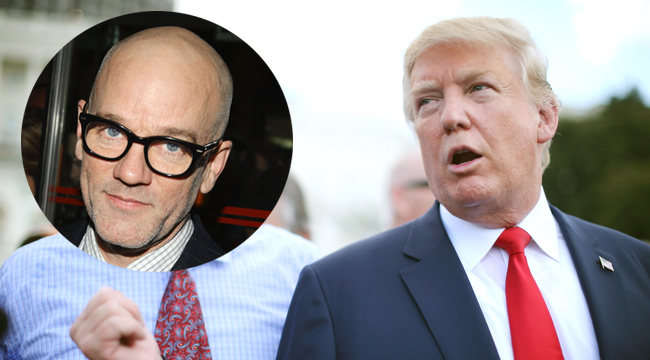
It’s something that happens at least once an election cycle. A politician uses a song to hype up the crowd at a campaign event, the artist catches word of it, and then publicly denounces the politician and their use of the song. The latest politico-band standoff came between R.E.M. and Donald Trump when Michael Stipe and Co. told the Donald to step away from their songs in no uncertain terms (alas, that was the second time this summer that an artist told Trump to stop using their songs; Neil Young did it back in June).
But is there anything that R.E.M., Young, and other artists can do to stop those politicians, other than complaining publicly? According to Kevin Thomson, a lawyer who formerly worked at Bad Boy Entertainment, this can be a bit of a gray area. When we asked Thomson if an artist’s work could be used by a politician without the permission of the artist, he was hesitant to give a definitive answer.
“I wouldn’t say that there is a clear cut yes or no to this question,” he said. “I would, however, say that it’s wise for politicians to request the permission of the artist before using their song on their campaign trail.”
Thomson elaborated further, saying that in cases involving politicians there’s an additional layer. “The concern here is that a politician’s use [of a song] may come across as an endorsement from the artist,” Thompson said. “This is less a matter of copyright and more a matter of publicity rights, which prevent the unauthorized commercial use of an individual’s name, likeness or other personal attributes.”
Thomson added that most venues have blanket licenses in place that give them the rights to publicly play many artists who are represented by organizations like ASCAP and BMI. But that’s not to say that artists have no right to ask a politician to stop using their songs, even if they are covered compensation-wise by the blanket licenses.
“The first step an artist could take is to request that the individual stop using the song by issuing a cease and desist and, in the event that they want to take it to the next level, threaten or file a lawsuit over the unauthorized use,” Thompson said.
While the artists’ rights in this situation aren’t much different than any other public performance, Thomson noted that these issues seem to arise more often around rallies because of the high profile of campaign events and people’s sensitivities regarding their own politics.
“I would say that the main difference is one of profile,” he said. “Politics clearly brings a lot more attention than a baseball game or a concert – and clearly people’s feelings are a lot more sensitive when it comes to their political affiliations.”
Artists typically don’t need to go much further than letting it be known they don’t want a politician using their songs. “Social media clearly makes issuing a statement quite simple. This is not that new of an issue and I think that, more often than not, politicians that are ‘called out’ will likely cease their use in order to prevent any unwanted publicity.”
However, Thomson did note that artists (who aren’t known for their deep pockets) are forced to weigh the costs of taking legal action, especially against someone with as much fiscal support as a politician.
“In all honesty, an issue that creators always face (and will likely continue to face) in enforcing their rights is the legal costs associated with any legal action,” he said. “I think it’s very important for creators to stand up for themselves any time they feel like their rights have been violated – but unfortunately, sometimes the benefits of pursing an action just don’t justify the cost.”






